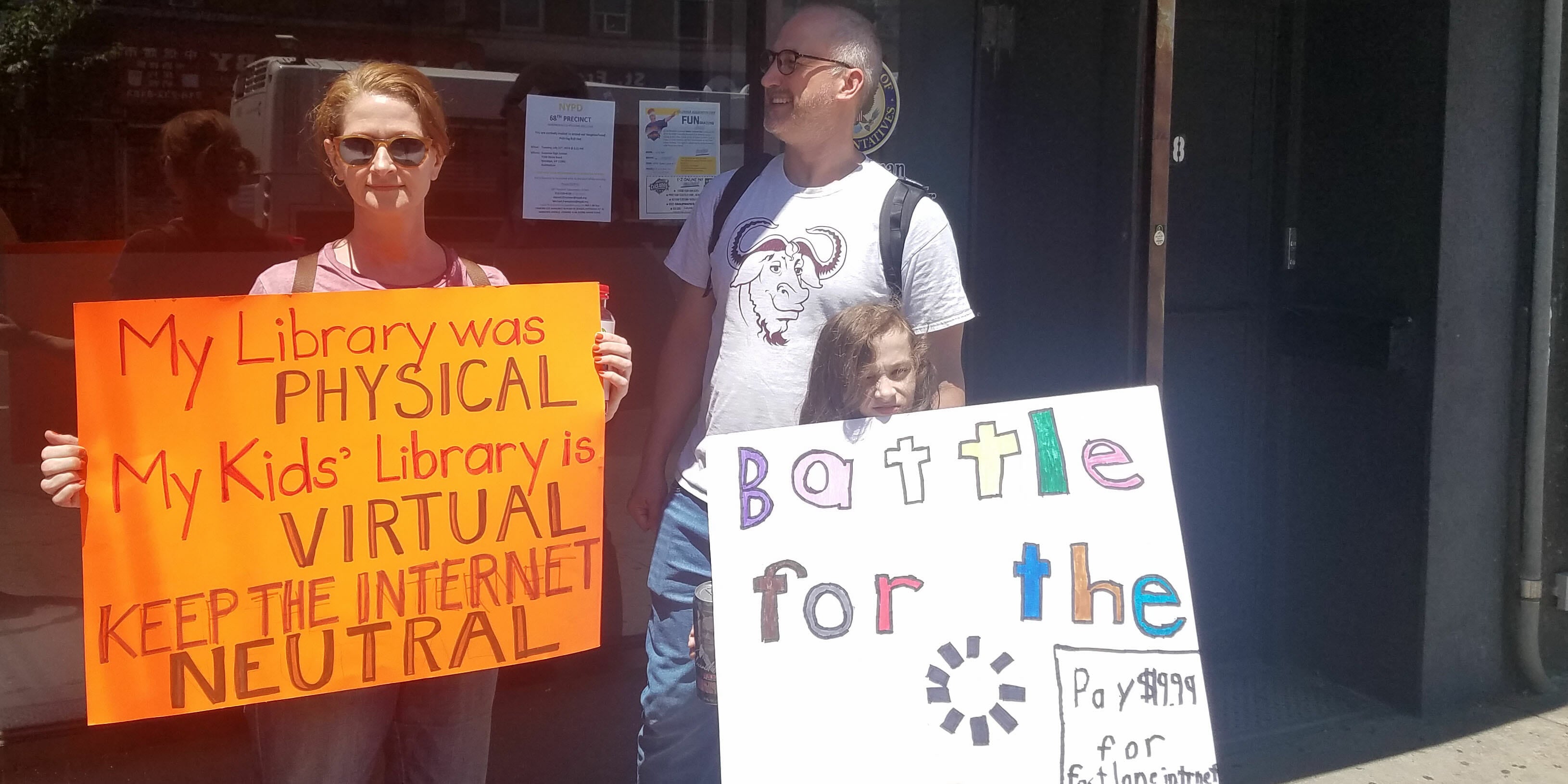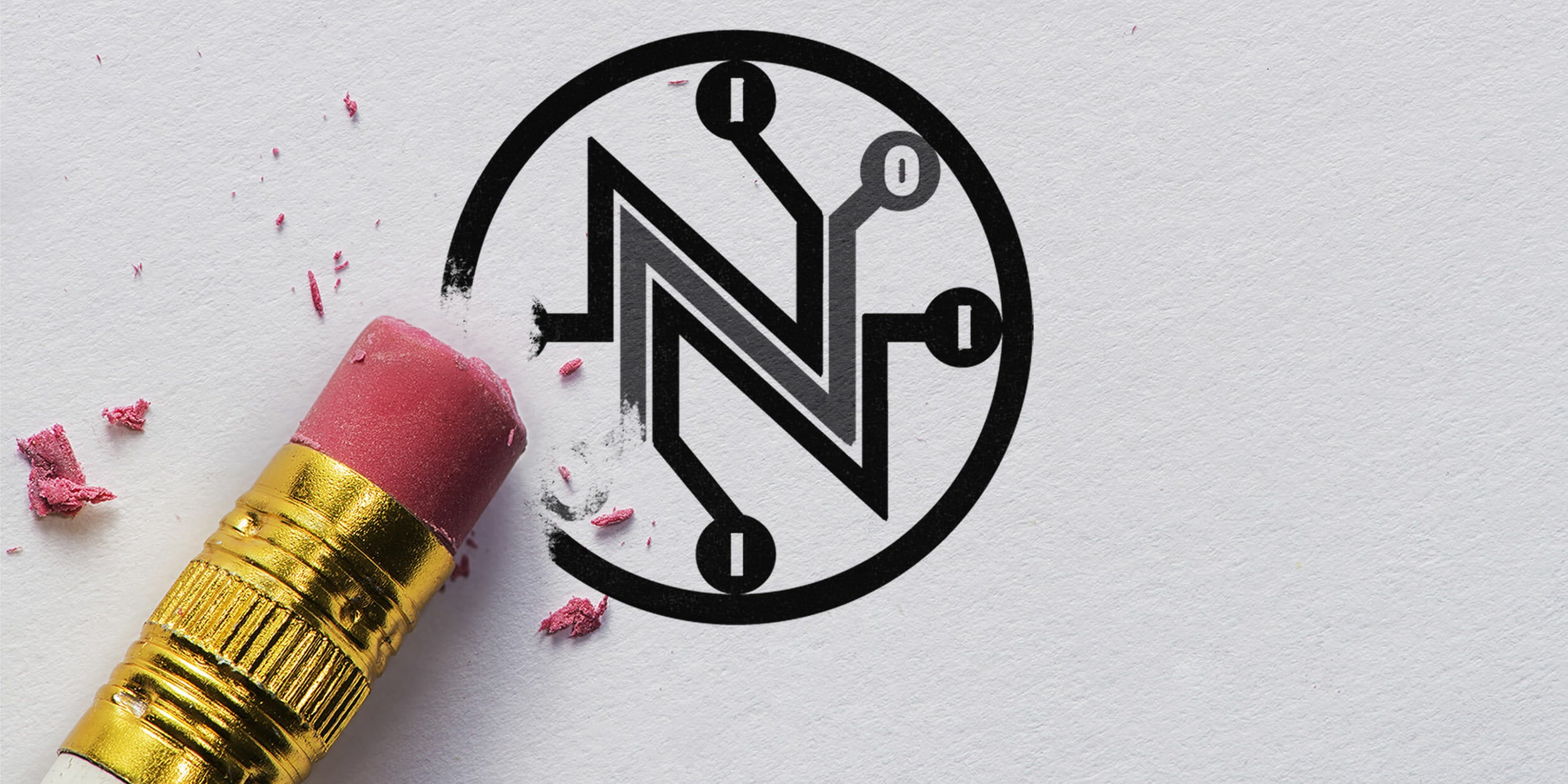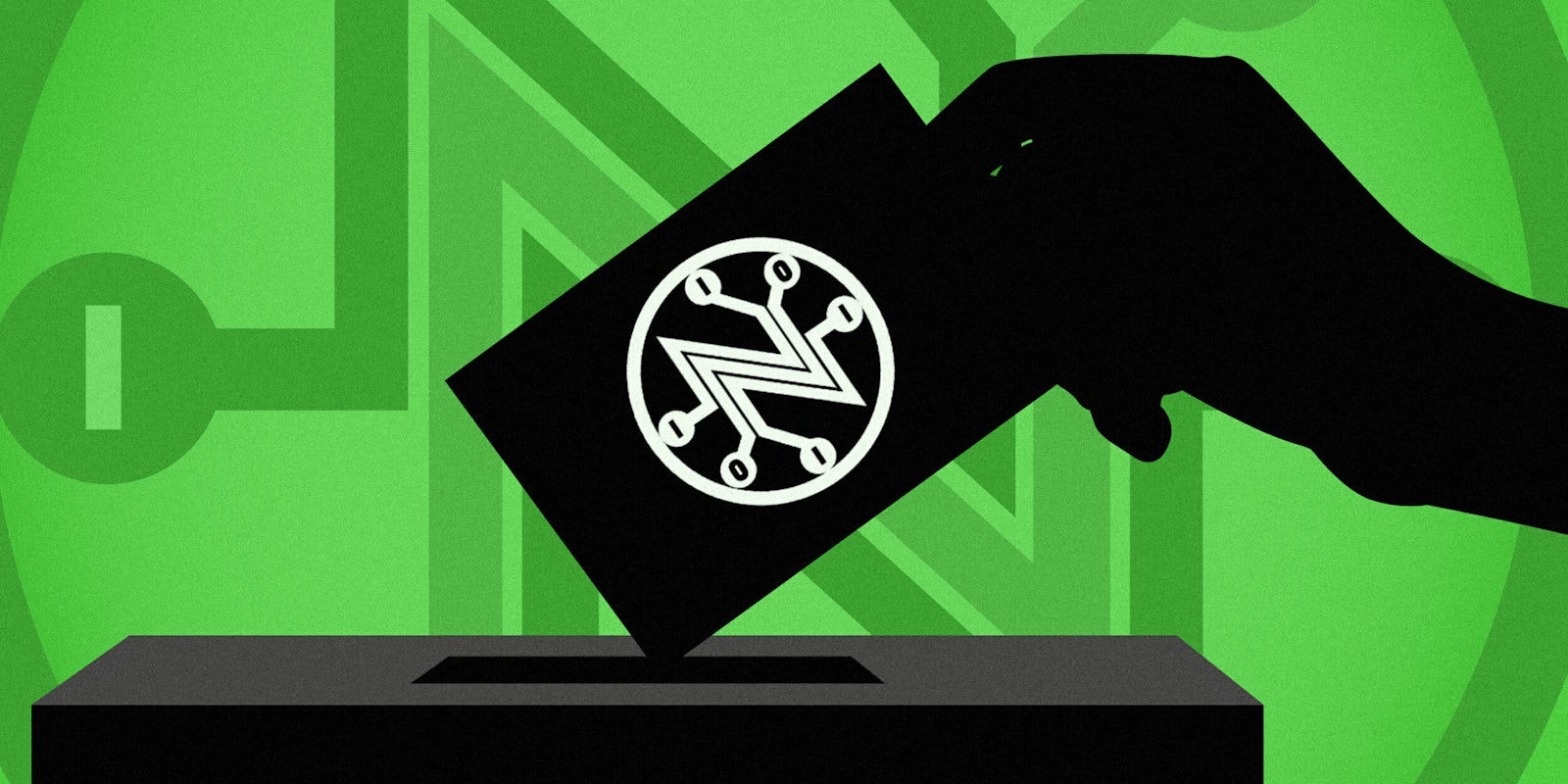When Liz Schmitt, a 50-year-old professor in New York’s 24th District, heads to the polls in a few weeks, she’ll have a choice to make.
Republican Rep. John Katko (R-N.Y.) is facing off against Democrat Dana Balter in her district. The race, which the Cook Political Report says leans Republican, has focused on issues like the economy and healthcare—but it’s Katko’s views on net neutrality that could end up costing him a voter.
That’s because Katko supports the Federal Communications Commission‘s (FCC) decision to repeal net neutrality in 2017. In a letter sent to Schmitt, he wrote that he believes “FCC regulation of the internet as a utility could inhibit innovation and progress.”
That may not be a surprising position given the $32,250 he’s reportedly received from internet service providers (ISPs). But it’s an unpopular one: His opposition to net neutrality even resulted in a Syracuse man leaving him a death threat via voicemail.
Net neutrality is a basic principle of the web that all internet traffic should be treated equally by ISPs. The protections ban an ISP like Verizon from slowing down Netflix in favor of speeding up its own streaming service. These rules also have been heralded by communities of color and disenfranchised people for allowing them to have equal access to the internet because their connectivity isn’t offered in tiers like cable subscriptions.
Balter has promised, if she wins, to try to reinstate net neutrality.
Net neutrality is important to Schmitt, so Katko’s support of the FCC’s repeal of the 2015 Open Internet Order, which enshrined net neutrality rules, is a deal-breaker.
“It’s probably going to determine my vote in the 24th District, it’s probably what is swinging it,” Schmitt told the Daily Dot on the phone.
“There are tons of controversial issues where I would agree with one candidate over the other. Things like gun control and healthcare—it’s hard to come to a consensus, people have some really strong feelings about that. But net neutrality is overwhelmingly popular with the electorate, so it should be a no-brainer. The fact that it’s not makes you really have to question a candidate that’s not going to wholeheartedly be behind something that over 80 percent of Americans want to have.”
Schmitt isn’t alone.
The Daily Dot spoke with voters across the country who say net neutrality—and the Congressional Review Act (CRA) efforts in Congress to overturn the FCC’s repeal of the protections—is among their highest priority in determining who they vote for this November. A number of these voters have been active in the past year, fighting the FCC’s efforts, and working with advocacy groups to raise awareness about the issue.
They’re among the overwhelming majority in the United States supporting net neutrality protections. A poll conducted by Mozilla and Ipsos in February found that 76 percent of voters strongly or somewhat supported net neutrality, while a separate poll from the University of Maryland in late 2017 found more than 80 percent of voters opposed the FCC’s plan to repeal the rules.
A more recent poll from Morning Consult—released less than a month ahead of the midterm elections—found that 54 percent of voters ages 18 to 29 said a candidate’s support for net neutrality was very or somewhat important, up from below 50 percent in May.
The support for net neutrality tracks along with other more talked-about 2018 midterms topics.
A Kaiser Family Foundation poll in mid-October found that a high number of voters thought healthcare (71 percent), the economy (64 percent), and gun policies (60 percent) were “very important” for their midterm voting decisions. But other issues like immigration, tax reform, and foreign policy hovered in the 50 percent to 55 percent range, putting net neutrality—according to Morning Consult’s poll—in the same arena among voters.
Midterms are referendums on the administration’s first two years in office, and President Donald Trump sets the American agenda daily via Twitter. He’s overseen a political climate fraught with emotion and unorthodox opinions. In an election that will highlight so many partisan issues of identity, how heavy will a free and open internet weigh on the minds of voters?
Net neutrality is a ‘litmus test’
Advocates say that any politician who opposes net neutrality protections isn’t keeping in mind their constituents.
“Net neutrality is a huge deal for me because, to me, it’s a direct reflection of how committed a representative is to his or her constituents as opposed to the people they are taking money from,” Ben Vogel, a 22-year-old research scientist, tells the Daily Dot. “Net neutrality is such a popular thing among actual constituents, but not popular among ISPs—but they have the lobbying money. To me, it’s a simple litmus test of how devoted a representative is going to be to their constituents.”
Vogel, who will be voting in a district that Rep. Tom Garrett (R-Va.) is vacating, says he will be voting for Leslie Cockburn, a Democrat who has come out in support of net neutrality. Cockburn’s opponent, Denver Riggleman, says he does not support net neutrality.
“I honestly think it’s the easiest decision to make,” Vogel says. “Either vote on behalf of your constituents or vote on behalf of the people who aren’t your constituents. It should be an easy decision, but if Congresspeople make the wrong decision, they should absolutely be worried about their re-election campaigns. It’s a big deal.”
Kirt Thomas, a 55-year-old voter in Missouri’s 4th District, says net neutrality is among many issues that will drive him to the polls—but he says the issue was so important to him that he joined a group of people who met with Rep. Vicky Hartzler (R-Mo.) a few months ago to implore her to support the CRA.
Hartzler has made no public comments about net neutrality, although she has received $10,500 in campaign donations from the telecom industry, according to the Verge.
Thomas agrees that net neutrality acts as a barometer for who he’ll vote for.
“Supporting [net neutrality] speaks to a fundamental philosophy of who and what I’d like to see in office,” he says. “For instance, somebody who is against net neutrality is probably somebody who is against other things that I would believe in.”
Schmitt feels similarly, adding that she has lobbied Katko’s office about net neutrality and that a vote in favor of saving the protections through the CRA petition—curently trying to gather enough votes in the House—could influence her vote.
“If he actually signed the petition, yeah, that would really make a difference,” she says of Katko. “As it stands right now, I won’t vote for him. I don’t agree with all of his positions because I tend not to be Republican… But if he actually listened to his constituents this time and actually did the right thing, that would weigh on me quite a bit.”

Yet the opinions of voters like Schmitt don’t appear to be on some Republican lawmakers’ radars.
Rep. Greg Walden (R-Ore.), the chairman of the House Energy and Commerce Committee, told Politico in early October that he thinks net neutrality is low on the list of priorities for most voters.
“I think if you go survey on the issues that voters care about, it’s number 38 out of 37,” he told the news outlet. “Some voters care about it, yeah, but they didn’t see the end-of-the-world dire predictions come true that the other side says would.”
Voters like Schmitt, Vogel, and Thomas, and others across the country have been voicing their support for restoring net neutrality. Many candidates seem content to ignore them.
Not a ‘left-right issue’
In June, nearly 50 protests were organized across the country where advocates met with lawmakers urging their support for the CRA. Meanwhile, activists have launched websites that show voters their local House of Representatives members’ stance on the issue, helping to educate them as they head to the polls.
Bill Glover, a 50-year-old software engineer and consultant, says he met with the staff for his representative, Rep. Mac Thornberry (R-Texas) to discuss the issue. He wasn’t successful in changing the Republican’s stance, so now, Glover’s volunteering on the campaign for Greg Sagan, a Democrat who is challenging Thornberry. Sagan also says he supports net neutrality.
“Net neutrality is one of those fundamental issues that, if we don’t pay attention to it, affects all of the other issues we’re dealing with, from civil liberties all the way to the economy,” Glover says.
All of the voters the Daily Dot spoke to for this story say they’ll likely vote for Democrats this election cycle. However, many of them stressed that they did not believe net neutrality should be a choice between Democrats and Republicans.
Over the summer, the Senate voted 52 to 47 to push through its own CRA and set up a fight in the House. During that vote, several Republicans bucked the rest of their party and voted to overturn the FCC decision, too.
While none of the Republican senators who voted to support the CRA are up for reelection, numerous senators who voted against it are facing challengers next month.
Sen. Ted Cruz (R-Texas)—who once called net neutrality “Obamacare for the internet”—is facing a challenge from Rep. Beto O’Rourke (D-El Paso) in what has become one of the most widely watched races in the country. O’Rourke has taken a vastly different stance than the junior incumbent senator.
Last year O’Rourke called the FCC’s repeal of the protections “dangerous for our very democracy” in a video posted on Facebook.
That stark difference in the stances on net neutrality between the two candidates has not gone unnoticed by some voters who support the protections.
“It’s a big deal. It’s been so rare to have a candidate that actually seems to get it,” Glover, of Texas, says. “He has the technical background, he understands what he is talking about when he talks about things like net neutrality. We’re not going to ever get ‘the internet is a series of tubes’ out of somebody like O’Rourke; he knows what he’s doing. It’s really encouraging hearing him talking about these things in a knowledgeable and concise way.”

The bipartisanship that was shown during the Senate vote has been less bountiful in the House. Only one Republican representative has said he will vote to overturn the FCC’s net neutrality decision, while at least one more allegedly promised to do so before backing out.
Rep. Mike Coffman (R-Colo.) was the first Republican to sign onto the discharge petition for the CRA in the House.
Coffman’s decision to break ranks with House Republicans and support the effort to overturn the FCC’s decision was appreciated by Zach Amdurer, a 31-year-old physician’s assistant in Colorado, who belongs to “Defend Net Neutrality Colorado,” a Facebook group.
“You have to give him credit for it—that he understood there is something wrong with making some sites work faster for some people and slower for other people,” Amdurer says. “It gives you a strange kind of indecisiveness where on one hand you really don’t support what the Republican party has done as a whole with net neutrality… There are some times when you have to commend someone for doing the right thing, and this is one of those rare moments that I’ve felt [that.]”
Ultimately, however, Amdurer says, despite his net neutrality position, other factors will lead to him voting against Coffman.
“While net neutrality has been very, very important, this one issue, while it unites all people and is one of the reasons so many were against the repeal… it’s not enough. There are so many things that have been rolled back,” he says.
Coffman has gone further than his House counterparts and introduced a bill, the 21st Century Internet Act, that would ban throttling, blocking, and paid prioritization. The bill was announced at the same time the Colorado lawmaker said he would sign onto the CRA efforts in what he called an “all of the above” approach.
“Net neutrality is an issue with incredibly wide support,” Coffman said in a statement to the Daily Dot. “Consumers, small businesses, and tech startups all need and deserve open access to the Internet without unnecessary interference from ISP’s. Our economy relies on a free and open Internet and we need to take immediate action to preserve this critical economic engine. My bill seeks to establish this principle, and I appreciate all the support I have received since its introduction.”
The lack of bipartisanship for members of the House to follow their Senate colleagues has frustrated some voters.
“This isn’t a left-right issue,” Noah Stepro, a 37-year-old history professor and pastor in California, says. “Nobody has anything to gain by making the internet not neutral—regular people have nothing to gain from this. You, me, it doesn’t matter if you’re a Republican or Democrat—it’s not benefiting you.”
Richard Aronson, a 62-year-old retired computer programmer and game designer in California, says he appreciates the efforts his representative—Rep. Tom McClintock (R-Calif.)—has made to listen.
Aronson says he disagrees with a lot of McClintock’s policies. However, he believes McClintock—who, in 2015, described net neutrality protections as “the notion that the latest cat video is of equal importance to a teleconference consultation for a heart patient”—has sought input on the issue since then.
“I’m inclined not to vote for him, but… he’s holding roundtables, he invited me to attend an online roundtable,” Aronson says. “I’ll give him credit for recognizing he’s got a lot of rural constituents and that we are being hurt more by the repeal of net neutrality more than people who can pick a different ISP.”
Meanwhile, Maxwell French, a 34-year-old small business owner in New York’s 21st District, says while the issue shouldn’t be partisan, it didn’t shock him that it has appeared to become that way.
“At its core [net neutrality] is really a corporation-versus-people issue, but it turns into a partisan issue,” French says. “I think, in part, because the way party politics shape up, one side will tend to seize on something that appears valuable politically; and Democrats obviously have picked up on the fact that a lot of their base is unhappy with the way the Republican side of things have basically ignored their constituents and what they want.”
French adds that he’s disappointed with his state representative Elise Stefanik’s (R-N.Y.) views on net neutrality.
Following the FCC’s repeal of the rules, Stefanik said she supported Congress passing legislation that “codifies in law the principles of net neutrality” while also ensuring “that companies can invest in robust broadband infrastructure.”
In a statement to the Daily Dot, Stefanik’s office says she supports “codifying the standards of net neutrality into law,” but added that she does “not support the use of a CRA to reinstate net neutrality standards as this would simply reinstate regulations that could be overturned by another administration.”
Many other lawmakers have called for a legislative solution to net neutrality, which activists believe is not as strong of an option as restoring the rules the FCC rescinded. Earlier this month Josh Tabish, of internet rights advocacy group Fight for the Future, told the Daily Dot legislation would be a “trap” where “ISP-friendly lawmakers” could “gut any good net neutrality bill that hits the House Energy & Commerce Committee’s desk.”
Regardless of how the midterms will determine the future of net neutrality, some voters have vowed to continue fighting for it moving forward—arguing that the fight for net neutrality, and this year’s midterms, could have drastic impacts on the future.
“I’m of an older generation, but I have grandchildren, and their friends are extremely reliant on [the internet] as a source of communication,” Carolene Logue, a 77-year-old California resident, says. “I think it is the future and so often, in my experience, until the future hits you on the head, sometimes you don’t pay attention to it.”
READ MORE:


